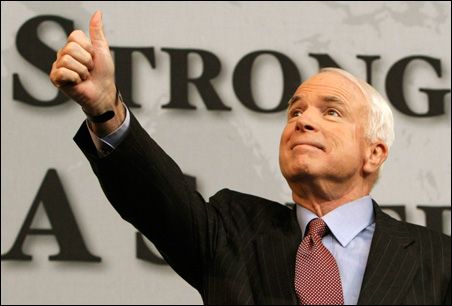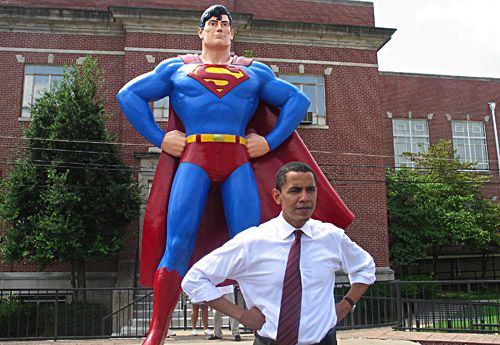“Virtue would not go to such lengths if vanity did not keep her company.”
~François de la Rochefoucauld
Would you rather be right? Or would you rather be president? Senator McCain would rather be right. There is no doubt that he is a person of high ethical standards. But here is a terrible irony: as the ancient Greeks warned, an excess of virtue can become a vice. Being too insistent that she was right led to Antigone’s downfall, as it can for anyone. A virtue becomes a vice when self-knowledge — which leads to moderation — is lacking. This fault might be called “ethical hubris,” the blinding egotistical pride about doing what one deems to be the right thing, no matter what the circumstances. Alas, it is Senator McCain’s fatal flaw.
The term “ethical hubris,” may seem like an oxymoron, for morality would appear to be the opposite of egotism. But a person can become puffed-up about anything. Hubris, in all its varieties, is terribly blinding and is bound to have tragic consequences. Unfortunately, the fatal flaws of kings and presidents — and senators too — can have tragic consequences for an entire nation. It is likely to result in McCain losing the election. And it may lead to the transformation of America, under the leadership of his opponent, Senator Obama, from “the land of the free and the brave” into a socialist disaster.
McCain’s ethical hubris appeared early on in the election. Some of his supporters created a TV commercial about Senator Obama’s notorious racist and anti-American pastor, the Reverend Wright. Out of a sense of honor and propriety, McCain insisted that these commercials no longer be shown. McCain saw himself as too noble-minded to engage in negative campaigning. McCain’s hubris blinded him to the obvious: the negative commercials were, contrary to McCain’s opinion, entirely appropriate. After all, the character of Reverend Wright, Obama’s pastor for twenty years, bared upon both Obama’s character and his worldview.
Furthermore, McCain has failed to realize that it is not his campaign. An entire nation has an enormous stake in his winning. It is his job to win, and the job of other people to help him to win. They nominated him to be a candidate, not to act as the Republican Party’s pope. The consequences of McCain’ s poor decision are very serious. Running the ads about the Reverend Wright might have given McCain the momentum to win the election, just as the Swift Boat ads were instrumental in President Bush winning against Senator Kerry.
McCain’s ethical hubris also prevented him from stating a simple truth about Obama: he is a socialist. Indeed, early on in the campaign, McCain was asked if Obama was a socialist. He lamely answered: “I don’t know.” On a later occasion, he stated that Obama’s wish to redistribute wealth is one of the tenets of socialism. But he would not do what he really needed to do: accuse Obama, in front of the millions of people who viewed the debate, of being a socialist. Doing so would have been beneath McCain’s gentlemanly, senatorial dignity. In failing to deliver the decisive blow — out of his blindly egotistical sense of personal pride — he let America down.
There have been other instances as well. In response to the financial crisis, McCain initially canceled his debate with Obama, to return to the Senate, to work on the bailout deal. Perhaps McCain saw himself as being virtuous, but he ended up getting himself into a chaotic mess beyond his control. Consequently, many people saw him as feckless and foolish. Here, again, McCain considered it more important to save the world than to keep his mind focused on winning the election.
Senator McCain is at it again. There is a grave danger that the Democrats will obtain the needed votes to obtain a filibuster-proof supermajority. Then they will be able to pass any and all sorts of leftwing legislation, and appoint very liberal justices to the Supreme Court. Thus every election counts. But Senator McCain is now insisting that Senator Ted Stevens, from Alaska — who has been convicted by a federal grand jury of ethical violations — resign. But doing so would mean that the Democrats come one vote closer to obtaining a supermajority.
Party loyalty has never been important to McCain. He views it as beneath his dignity. After all, as he has reiterated in the debates, he is a uniter, a nonpartisan; he prides himself on reaching across the aisles to the Democrats. But when President Reagan ran for office, he didn’t need to reach across the aisles. Instead, waves of Democrats reached across the aisle to vote for him. He even won New York in the electoral college.
Of course, we cannot completely blame McCain if he loses. His opponent is, after all, a very skilled politician, indeed a ruthless demagogue, with far more funding than McCain. And then there is the very unfortunate fact that the economy has gone into a nose dive, leading people to blame the Republicans, and to want to vote them out of office. In one sense, then, it is to McCain’s credit that he has done as well as he has done. Furthermore, he has displayed both intelligence, courage, and boldness, in many instances, such as when he chose Governor Sarah Palin to be his running mate.
But, there is no doubt that if McCain possessed a greater degree of self-knowledge he would now be at least tied in the presidential polls. Unfortunately, his tragic blindness may soon become America’s tragedy.

